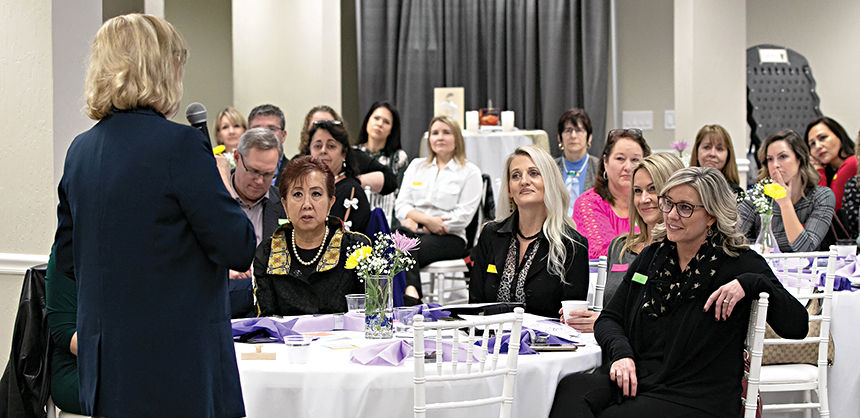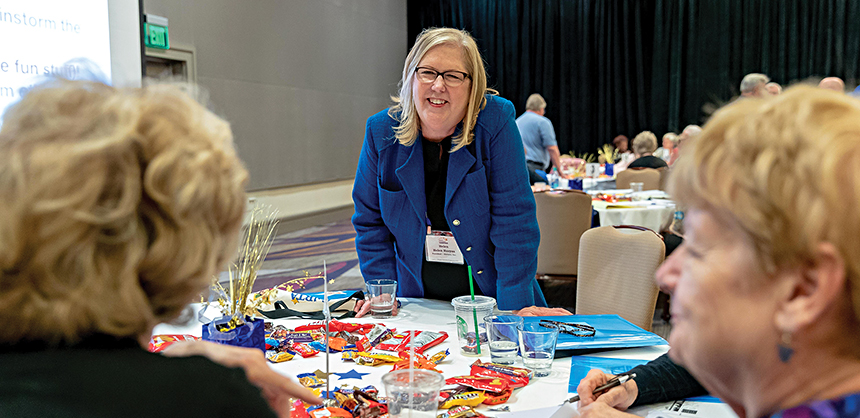Career AdviceDecember 29, 2020
Thousands Of Meetings And Events Workers Found Themselves Jobless During The Pandemic By Patrick SimmsCareer Advice
Thousands Of Meetings And Events Workers Found Themselves Jobless During The Pandemic
DepositPhotos.com
Like so many professionals in the events and hospitality industries, planners are trying to find their footing in the new reality that took hold this spring. The most fortunate have been retained by their companies to handle virtual or hybrid events, although in many cases on reduced hours. The less fortunate have been temporarily furloughed or simply let go, and find themselves facing a highly competitive job market where event planners are in low demand.
Hurdles to Overcome
As difficult as the job search can be, it is typically not the first hurdle. The immediate challenge is emotional, particularly for planners who are passionate about the profession and consider it part of their identity. “The emotional distress that people feel when they’ve lost what they like or just lost what they know is profound, and it’s normal,” says career development expert Helen Horyza, author of the recently released book “Elevate Your Career” and founder of Career Coach Entrepreneur Academy. Horyza, who is currently working with several professionals whose careers have been disrupted by COVID-19, maintains that once the anxiety and resentment are acknowledged as normal, “you can calm down enough to start making some of those rational, strategic decisions that are really going to make a difference.” Calming down includes letting go of the resentment, which can compromise the positive attitude one needs in the job market. “You are justifiably upset. In this roulette wheel of who’s going to get nailed, you got nailed. That’s really hard. Having said that, anybody who wallows in that victim perspective will not do well psychologically,” she advises. “They pay the biggest price for being focused on how unfair this is. So take the biggest dose of self-responsibility and take control of your life. Those planners who take a positive attitude are your leaders, and they’ll help others get out of this.”
Indeed, Horyza recommends helping others as a means of stress management during the job search. “Job seekers who spend a little time volunteering or taking care of somebody else will feel better about themselves,” she says. Planners, who specialize in bringing people together, themselves have always been a very close-knit group of professionals. And that community is an invaluable resource for the many who are struggling to reestablish their careers. In addition, it helps with stress management, as these planners will feel less alone in their circumstances.
Catherine McKenna, CMP, CMM, executive innovator at her own events company, CMK Solutions, has found solace during this trying time by ramping up her efforts to connect with colleagues and others in her circle. “The simple things have become the highest focus for me, sending letters and digital notes such as ‘Way to Go’ and ‘Thinking of You!’ and creating a series of weekly communications that I can share to keep people connected,” she says. McKenna has even rediscovered the forgotten art of writing letters. “I’ve had these amazing correspondences with old school letters with a number of people along with the texts and emails.”
McKenna had a contract position as a planner with KPMG that ended in 2019. The last event she planned took place within the first two months of 2020. “It’s been a sobering, humbling experience,” she says. “I’m really lucky [in that] I’m actually an essential worker right now. I work for Abbott Labs and put together the COVID-19 test kits, which isn’t where I want to end up, but it’s been really interesting.” In the meantime, she continues to seek both full-time and contractual planning opportunities. “The events and planning side is really where my passion is,” she says.
Given her penchant for highly personal communications, McKenna takes a similar approach in her cover letters by adding a visual element. “When I’m being introduced to somebody I embed a video into my cover letter so they can click it and see me introducing myself,” she says. “You have to bring yourself to life. I started doing that at KPMG when I was dealing with partners and their executive team.”
Such an approach can make a job candidate stand out in what is quite a large crowd of planners seeking work. Companies who receive scores of applications often use applicant tracking system (ATS) software used to scan resumes.
Kim Hentges, CMP, who was furloughed from her position on Aug. 1 as event manager for IntelliCentrics Inc. and was recently rehired as a project manager, advises that “approximately 70% of resumes go through this type of software first, [so] you should use a simple generic template with no formatting. Formatting may disrupt the score the software assigns to your resume. For each position, provide a few sentences describing your role and then add bullets to highlight your accomplishments. Utilize both hard and soft skills.”

Networking remains one of the top ways to get hired for full-time, part-time and even freelance work, especially in a difficult job market. Photo courtesy of Helen Horyza
Use Available Tools
In addition, Hentges has found a couple of tech tools quite useful in the resume-writing process, TagCrowd and Grammarly. The former is a web application for “visualizing word frequencies in any text by creating what is popularly known as a word cloud, text cloud or tag cloud. Utilize this tool to insert a job description to determine keywords [buzzwords] that should be used in your resume to ‘match’ the job posting,” she suggests. “Grammarly is a writing assistant to improve your writing style by making it more appealing and effective. There is a ‘free’ basic version.”
Unfortunately, planners with excellent resumes who follow all these tips still face a low probability of finding a full-time planning position in the current market. Part-time, freelance and temporary positions are significantly more attainable, and networking is an invaluable resource in landing these roles. “I participated in an industry webinar that mentioned becoming a freelancer [entrepreneur] could very well be the job of the [near] future,” Hentges says. “A CMO that I worked for at a previous employer reached out to me through LinkedIn to inquire if I was available and interested in assisting with a temporary project-management opportunity. She had left that employer a while back and had started her own consulting company. We had a conversation that afternoon. I received the contract that evening and started on the project the next morning. Networking is powerful, and typically the key to getting your resume in front of the right hiring person.”
While planners who have had full-time employment will naturally regard contract work as less than ideal, it is at least a means of staying in the industry. “I worked hard to get my CMP and my CEM. I just don’t want somebody to tell me I have to throw this all away,” says Tammy Port, CMP, CMM, DES, who had been part of the events team at a retail corporation for over eight years. “At the time of my furlough [ in late May 2020], it was decided that the annual meeting was likely going to need to be a virtual event. They took a look at my position and didn’t see a need for my services within the next year, and that was the deciding factor,” she says. “I think the assumption a lot of times with virtual events is that they’re easier and don’t require as many people coordinating them.” In order to continue utilizing her planning skillset, Port decided to begin doing contract work. “I’ve been working with a local production company to assist them for doing tech support for their virtual events,” she says. “I have another colleague with the National Diamond Council who’s doing virtual events and needed assistance with getting people registered and sending out communications. And then I’ve also been doing technical support for Pathable. So that’s keeping me busy.”
Although contract work siphons time away from the search for a full-time position, that work can be a source of leads and thus ultimately conducive to the job search. “People want to hire someone they know and that they trust,” Horyza says. “And so your event planners that are out there consulting are building their reputations.”
Find Another Passion
Depending on their economic situation and degree of luck in the search for planning work, some planners may feel it is time to transition into another field. A vital first step in this direction is to consider the aspects of planning that were most fulfilling, in order to look for some of those same qualities in a different profession. For example, many planners enjoy directly experiencing client satisfaction. “When a program runs and you see the enjoyment and the satisfaction on people’s faces, you see the interaction that happens, it’s awesome,” McKenna says.
Jobs that involve a humanitarian aspect and “some degree of unpredictability” may also pique planners’ interest, Horyza says. Planners considering a new career “would be wise to do what I call a creative pivot, which is to take a look at what you do well and what you love, and see if there is a way for you to modify that to make some money or maybe start over.” Regarding what they do well, planners have plenty of transferable skills and qualities. “Some to consider include contracting, negotiation, vendor management, leadership, project management, financial accountability, teamwork, problem-solving, building and maintaining client relationships and, of course, adaptability,” Hentges says.
Shannon Guggenheim, who has a reduced-hours position as vice president of meetings & events at EventLink International, adds a few others to that list: “Good meeting planners are wicked organized, which can transfer into almost any other field. Planners are also skilled at handling high-stress environments, dealing with multiple stakeholders and handling budgets of all sizes.”
Project management transfers to a variety of jobs that include managing complex projects beyond events. “They also might really like helping people under pressure and might look at something like going into coaching of some sort,” Horyza says. Given planners are used to high-stress situations, “I also think it might be interesting for them to transfer to some emergency management kinds of jobs,” she adds. Planners also tend to be empathetic individuals. They care about their attendees and the destination’s community, often conducting corporate social responsibility (CSR) initiatives. As such, they may be interested in elder care. “I see some of our hospitality folks working with elders, which I’ve done since 2008,” McKenna says. “There are a lot of senior communities, and it’s an enormous business.”

Helen Horyza, author and founder of Career Coach Entrepreneur Academy, suggests those who lost their jobs maintain a positive attitude. Photo courtesy of Helen Horyza
Invest in Yourself
Job-seeking planners with some extra time on their hands may also find it worthwhile to invest in continuing education. When the industry recovers, they’ll be even better prepared to land a new position. Perhaps it’s the ideal time to pursue a CMP or CMM, or seek education on certain topical issues in planning. For example, as virtual and hybrid meetings are the wave of the future, it’s a wise choice to gain education in this area. “PCMA has offered the Digital Event Strategist for a while. I’ve sort of had my eye on it, but I’ve never felt the need to invest in it because virtual is ‘nice to have’ but not ‘have to have,’” Port explains. “But when things were taking a heavy turn to virtual, I decided to pull the trigger and go through that course. So, that’s one thing I did while I was furloughed.” Along with several webinars on virtual and hybrid meetings, Guggenheim has also sought continuing education in another timely topic: Negotiating contracts with more sensitivity to cancellation clauses and pandemics such as force majeure.
Some have also found value in continuing education that is not specific to planning, such as various courses offered at local colleges. These institutions offer numerous “industry-recognized certificate series and certification preparation training programs in information technology, management, administrative, finance, logistics, health sciences, education, creative, entrepreneurial and service career fields,” Hentges says. “Many of the courses are online, self-paced based on a specific time frame, and the cost is reasonable.” One potential pitfall in this area is investing in a costly advanced degree “without a clear sense of what you’re going to do with it,” says Horyza, who shares anecdotal evidence of event planners enrolling in MBA programs without specific careers in mind. Similarly, “you would never allow an event planner to plan a big, expensive event and not have any idea of what the objective is,” she points out.
Despite the multiple transferable skills in meeting planning and the many education options that can help one transition to a new career, a planner will understandably prefer to reset his or her meetings career. After all, that’s where their passion and core skillset lies. Resetting may mean a long period of sparse contract work, job hunting, networking and continuing education — particularly in hybrid best practices and technology. But many are doing so with optimism about the return of face-to-face meetings. “When people are comfortable with traveling, the floodgates will open at once. It will be a tremendous opportunity for project leaders [planners and events specialists] to engage,” McKenna says.
The consensus is that the unleashed demand will come with some changes in how meetings are conducted, such as increased use of the hybrid format since many attendees have become used to virtual participation. And there may well be some lingering pandemic-era practices in the face-to-face component. “I do think meetings in person will come back in force once we are past this pandemic,” Guggenheim says. “However, I think in-person meetings will be forever changed — e.g., no more buffets, emphasis on cleanliness, smaller groups, etc. I think meeting planners will have to learn and be prepared for this ‘new’ way to do meetings.” A revamped meetings industry is thus on the horizon, and with it, new opportunities for planners who are currently preparing for that future.
Use LinkedIn Like a Pro
Kim Hentges, CMP, a longtime corporate planner who was on furlough but then rehired as a project manager, shares tips on optimizing one’s usage of LinkedIn. The basics are (1) having a profile with an appropriate photo, and (2) utilizing all the features LinkedIn has to offer.
• Search for your next job by title, skill or company.
• Pay the monthly premium service, which provides benefits such as five InMails per month, see who’s viewed your profile, job insights, LinkedIn Learning and more.
• Gain access to LinkedIn Learning to “up-skill,” which can be essential in finding that next career adventure. After completing each course, a badge can be posted in your profile’s Certification section acknowledging this achievement.
• Be sure to update the Skills — you can have up to 50 — and Endorsement section applicable to the career you are pursuing. The first three skills mentioned should be the top skills associated with the position you are seeking.
• Have colleagues provide testimonials in the Recommendation section.
• Utilize the Interest section with influencers, companies and schools you want to follow. Focus on groups relevant to your career choice. Your network includes your first-, second- and third-degree connections, as well as the members of your groups. C&IT








